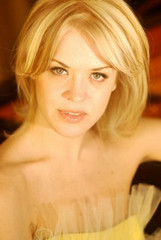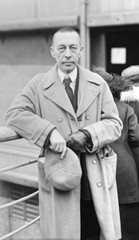|
Back
Volatility! New York
92nd Street Y
02/01/2014 -
Robert Schumann: Carnaval, Opus 9
Charles-Valentin Alkan: Twelve Etudes in All the Major Keys, Opus 35: Etude No. 3 in G major
Frédéric Chopin: Sonata No. 2 in B-flat minor, Opus 35
Sergei Rachmaninoff: Etudes-Tableaux Opus 39 No. 9 in D major, Opus 33 No. 7 in G minor (“Scene at the Fair”) & Opus 33, No. 5 in E-flat minor – Preludes Opus. 32 No. 1 in C major (Allegro vivace), Opus 32 No. 5 in G major (Moderato), Opus 32 No. 8 in A minor (Vivo), Opus 3 No. 2 in C-sharp minor, Opus 23 No. 7 in C minor (Allegro), Opus 32 No. 10 in B minor (Lento), Opus 23 No. 5 in G minor (Alla marcia), Opus 32, No. 12 in G-sharp minor (Allegro) & Opus 23, No. 2 in B-flat major (Maestoso)
Olga Kern (Pianist) 
O.Kern (© www.olgakerncom)
About 15 seconds into the “Préambule” from the opening Schumann Carnaval, I had the feeling that Olga Kern was heading for a collision. The tempo was far too fast, her fingers, if she retained that kind of velocity, might actually ruin her playing.
Fifteen seconds after that, I realized that I had misunderstood Ms. Kerrn. In trying to avoid nationality, gender and history, I had forgotten that Olga Kern is Russian through and through, Her mentor, Van Cliburn, had shown Russians a certain amount of Russian-American playing, but Ms. Kern–whose forebears apparently worked with Tchaikovsky and Rachmaninoff–was the inheritor of particular Russian tradition, and she was a brilliant exponent of that tradition.
Hers is the tradition of blood relationship with music. The volatility, the razor-sharp verging on the maudlin, the liquid tones were played by the fingers. But it is the heart which overcomes the mind, And with the technique like this still young, very glamorous woman (more on that later), we were encountering a woman who was absolutely magnetic.
Carnaval is like Schumann’s version of the “Diabelli” Variations, with every mood expressed. Beethoven needed no pictures. Schumann put keys to the images. And Olga Kern gave voltage to the whole piece.
She was not afraid of pausing to make her effects (note the “Valse Noble”) or jumping over the keyboard in “Paganini” or turning the staccato of “Pantalon and Columbine” into an electric circuit. “Paganini”, though, was a better name for her total composure here, for Ms. Kern sustained the more elegiac passages like a violinist more than a pianist. (And the pedal was pressed down rarely.)
And yes, she took the fast passages and breakneck speed. And yes, the slow passages were slow and meditative, like this was Tchaikovsky, not Schumann. But it was a grand performance, where the final “March of David’s Army” came as an inevitable climax, not simply a grand finale.
Ms. Kern didn’t really need to impress us with the following Alkan Etude. We knew that already. Yet the following Chopin “Funeral” Sonata was again played with a nobility which led–again inevitably–into a dizzying finale. Usually that finale is a mystery. Here, Ms. Kern was saying that all which went before was so important that no adequate “rational” summing up could do. “That,” her fingers seemed to say, “was rational. Here is the irrationality of pure emotion.”

S. Rachmaninoff (© Wikimedia Commons)
Sergei Rachmaninoff was the composer of the second half–but a few non-musical comments are due.
To eulogize the first anniversary of Van Cliburn’s death, Ms. Kern altered the program to play Mr. Cliburn’s “favorites.” She also wrote a heartfelt anecdote about the pianist which showed her own emotional heart.
And while I am anything but a fashionista, I was overwhelmed by her change of dress for this half, a shimmering red semi-backless dress which seemed to awe the 92St Y conservative audience. I saw it from the balcony (where the sounds are much better than below) and even here, it glistened.
Somewhere I read that Ms. Kern chooses colors to fit her music (like Scriabin?), and red goes with Rachmaninoff. But she also mentioned that red roses were Cliburn’s favorite. So perhaps this was in his honor as well.
At any rate, this was a fiercely romantic Rachmaninoff. Yes, the familiar march in the G Minor Prelude stamped along, but she was tender, wistful and always, always melodic.
The other night, when Marc-André Hamelin played Medtner, I had wondered why he doesn’t have Rachmaninoff’s popularity. Olga Kern gave the answer. Both neo-romantics working far into the 20th Century, were original, competent and lovely. But Medtner often became trapped in his own jungle of notes. Rachmaninoff might step into the complexity of music, but for his style, the melody was most important.
Ms. Kern made those tunes come out, but never forsook the evanescence, the pure ongoing energy of the music.
She is no Horowitz, she never pulls music apart to make her point. Yet one does feel that same luxury of ecstasy in Rachmaninoff, luxuriating in (what she wrote with uninhibited words in her note on Cliburn) “the incredible magic in this world–MUSIC!”
She played last night (not performed but played, including three encores) with the same enthusiasm, the same high voltage and, yes, the same magic.
Harry Rolnick
|